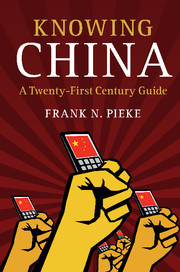Book contents
- Frontmatter
- Dedication
- Contents
- Preface
- Main Events in China, 1976–2015
- 1 Introduction: Knowing China
- 2 Why the Communist Party Will Not Fall from Power
- 3 China's Economy Will Continue to Grow, but Not Forever
- 4 Freedom without Universal Human Rights
- 5 From Empire to Nation, or Why Taiwan, Tibet and Xinjiang Will Not Be Given Independence
- 6 Not Just a Chinese Century
- 7 Conclusion: The Communist Party and China's Future
- Further Reading
- References
- Index
2 - Why the Communist Party Will Not Fall from Power
Published online by Cambridge University Press: 05 July 2016
- Frontmatter
- Dedication
- Contents
- Preface
- Main Events in China, 1976–2015
- 1 Introduction: Knowing China
- 2 Why the Communist Party Will Not Fall from Power
- 3 China's Economy Will Continue to Grow, but Not Forever
- 4 Freedom without Universal Human Rights
- 5 From Empire to Nation, or Why Taiwan, Tibet and Xinjiang Will Not Be Given Independence
- 6 Not Just a Chinese Century
- 7 Conclusion: The Communist Party and China's Future
- Further Reading
- References
- Index
Summary
The CCP and Violence
The rule of the CCP is rooted in terror and violence. This is less special, unusual or evil than it might seem. All modern states are built as much on warfare, conflict and repression as on a social contract between citizens and rulers. The creation and use of conflict and the application and display of violence are normal instruments of rule, even in the most peaceful democracies. A state's monopoly of violence is never a certainty but has to be fought for and defended against external and internal competition, not once but constantly.
The CCP however has been highly unusual in the extent, frequency and scale of the application of violence and the ability to find or create ever new enemies to rally against: in the Party, in the nation or abroad. The CCP and its state were an almost perfect example of mid-twentieth-century totalitarianism, the instrument of the whims of an absolute, deified leader. Totalitarianism is different from ordinary dictatorship or authoritarianism. Totalitarian rule and its ideology enter all institutions of society and reach all individuals, dedicating them to constant mobilization for the relentless application of violence for war and terror on an industrial scale.
The CCP's defining feature is its absolute dedication to the transformation of society born from the early-twentieth-century Chinese obsession to ‘save the nation’. In despair over China's ‘national humiliation’ at the hands of Western powers and – even more jarring – Japan, students, scholars, activists, politicians and even military leaders explored virtually any idea, ideology or concept that might be the philosopher's stone of modernity, strength and power.
Marxist socialism was just one of these. Certain aspects, such as socialism's stance against nationalism and a revolutionary strategy firmly rooted in an analysis of industrialized Western societies, badly fitted an early-twentieth-century Chinese perspective on progress and modernity. Yet socialism's very root in Western progress and modernity also made it immediately appealing. It claimed scientific status and promised objective truth; condemned traditional rule, religion and established privilege; prescribed a radical overhaul of society and a fundamentally new social order; and legitimated the use of violence against anybody that stood in the way.
- Type
- Chapter
- Information
- Knowing ChinaA Twenty-First Century Guide, pp. 15 - 49Publisher: Cambridge University PressPrint publication year: 2016

